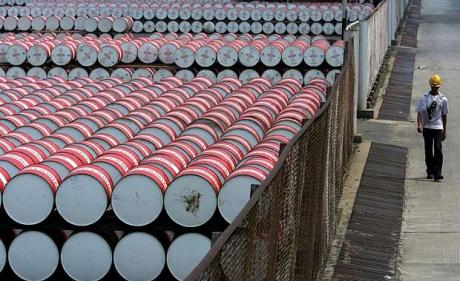There are no products in your shopping cart.
| 0 Items | £0.00 |


NIGERIA is facing the risk of an unprecedented economic crisis as about 84m barrels of the country's crude oil is currently stranded at sea with the country unable to find buyers for the cargo despite it being given away for next to nothing.
Highly dependent on crude oil exports for its survival, Nigeria is a mono-economy with over 90% of government revenue coming from petroleum sale receipts. Nigeria's 2020 budget of $28.8bn is predicated on the country selling 2.1m barrels of oil a day at a minimum price of $57 a barrel.
Over the last few weeks, however, the global price of crude oil has totally collapsed, falling to below $0, although the market has since corrected itself with prices now hovering at around $26 a barrel. However, with the market over-supplied and there being a global crude glut, suppliers like Nigeria are struggling to find buyers, leading to the growth of huge stockpiles at their export terminals.
According to the Wall Street Journal, Nigeria currently has about 84m barrels of crude oil stranded at sea with nowhere to go. In an April 27 report, the newspaper said cargo ships filled with Nigerian crude were competing to fill the last few empty tankers still left at sea.
Apparently, this oil, from production fields managed by Royal Dutch Shell and Exxon Mobil is not wanted as most countries have severely reduced consumption. It is now believed that a situation whereby companies run out of vessels would make shutting the oil fields inevitable, creating an additional problem for Nigeria as most of her wells are too old to be restarted once they go idle.
Kola Karim, the chairman of Shoreline Natural Resources, said: “When there are no more vessels to load the crude, then the entire world collapses. You will have serious, serious security implications and unrest.”
According to the Wall Street Journal, a tanker was turned back from the US Gulf Coast and it returned to the Canary Islands, where other Nigerian-hired ships are idled. In response to the fall in crude prices, Nigeria slashed its 2020 budget and reduced the budgeted crude benchmark but even then, the government will still struggle to generate any revenue.
Seeking to address the situation, the Organisation of Petroleum Exporting Countries and its allies have agreed on a graduated supply cut that is scheduled to last until April 2022. Some analysts doubt if this will work, however, as they are sceptical that the major players, especially Saudi Arabia and Russia will stick to the agreement.